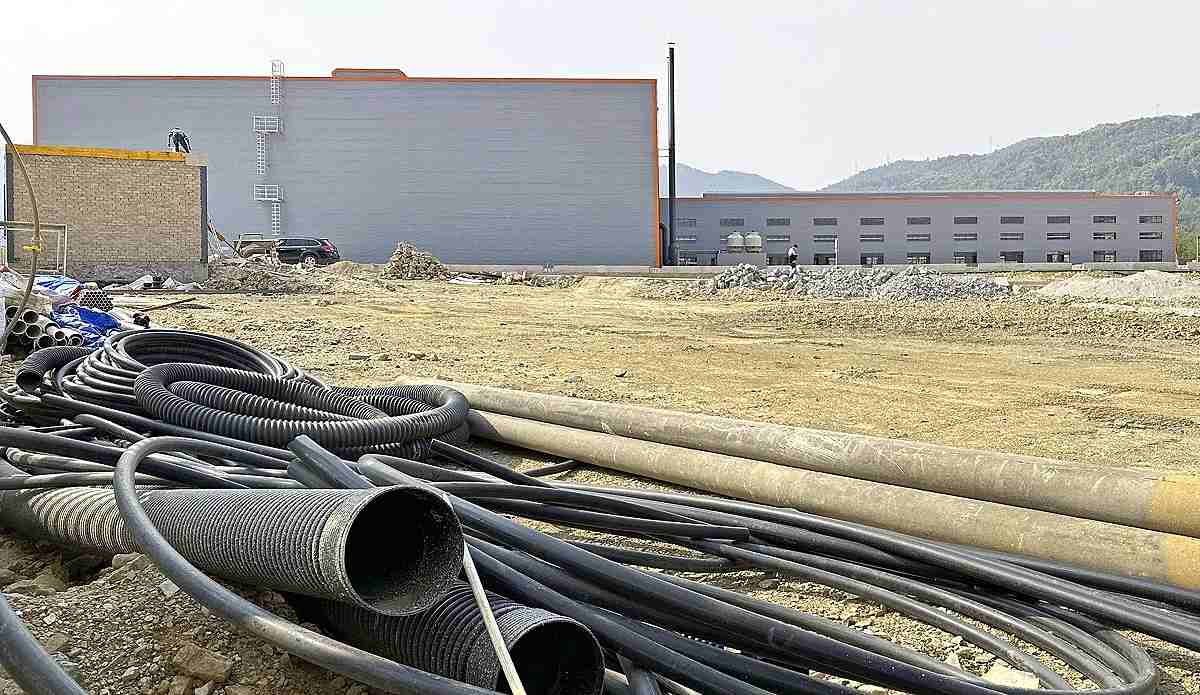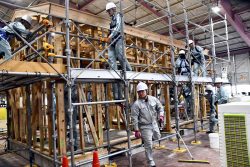- Business Series
- Dealing with China
Economic Security Issues / China Gives Preferential Treatment to Foreign Company Only to Obtain Technology

A rare earth plant under construction in Baoshan, Yunnan Province, China, in May
15:02 JST, July 14, 2023
This is the second installment of a series exploring how Beijing’s actions are affecting firms doing business with China.
***
The Chinese government’s draft of a revised list of export restrictions on industrial technology in December included a dubious scheme, although whether it was intentional or not remains to be seen.
In the section on rare earths, which are the focus of attention in many countries, the export of some mining technologies was changed from “prohibited” to “restricted.”
Several U.S. and European governmental officials who had assumed that China would tighten restrictions, misjudged that China had reversed course and had begun to ease restrictions, they said.
However, a close examination of the proposed revisions revealed that the list newly included in the prohibited items manufacturing technology for high-performance rare earth magnets such as neodymium. High-performance magnets are a core component of electric motors, which are a key product for decarbonization.
The easing of export restrictions on mining technology is nothing more than a measure that allows China to mine rare earths overseas, such as in Myanmar, and China is attempting to secure them by preventing other countries from doing so, an industry source said.
“China makes other countries believe it is cooperating with the international community by giving the impression of deregulation, but in fact it is skillfully promoting its own interests,” the source said.
Around the summer of 2021, an official from a Chinese company approached a Japanese parts manufacturer that makes motors for multifunction printers.
“Japanese multifunction printers will not be sold in China sooner or later. I think it would be more profitable for you to sell the motors to us,” the official said, according to the Japanese manufacturer.
The manufacturer wondered how the Chinese official knew that multifunction printer makers procure motors from it.
There is no doubt that Chinese companies are paying close attention to the manufacturing technology for high-performance motors, which will become even more important in the future, and they are gathering information on parts makers that foreign manufactures procure from.
There is a strong view among Japanese companies that China has concluded that it would be a shortcut to absorb technology that it cannot acquire on its own from neighboring Japanese makers.
The traditional Chinese approach is said to be to acquire technology through joint ventures, offer the Chinese market on the condition that Chinese employees are trained to acquire technology, and headhunt engineers from Japanese companies.
The acquisition of rare earth magnet technology, in which Japan was once internationally competitive, is a typical example of the Chinese method of acquiring technology through joint ventures.
As Japanese manufacturers began promoting creation of joint ventures with Chinese firms around 2014, companies capitalized solely in China are now able to produce low-cost, high-performance products. By 2021, China accounted for 80% of the global market, while Japan’s share dropped to 20%.
According to sources, Chinese companies say to their Japanese joint venture partners that their products will not sell unless they provide information on their suppliers of critical parts of the products and induce them to offer the information. Large manufacturers of finished products keep up their guard, so such Chinese firms target parts supplies, they said.
The European Union Chamber of Commerce in China writes in a report that China’s domestic production strategy is divided into three categories that can be compared to types of airplane seats.
In areas such as semiconductors, which are important from a national security perspective and where Chinese companies are uncompetitive, China favors foreign companies by treating them as “business class” in order to attract them to the Chinese market. Sectors of secondary importance are treated as “economy class.”
If Chinese companies gain the ability to produce products domestically by themselves, foreign companies will soon be downgraded from “business class” to “cargo space,” and then China will exclude them from government procurement and criticize such foreign companies in media to eventually drive them out of the Chinese market.
Then, it is believed that China tries to mass-produce cheap products to create a situation in which other countries will be forced to depend on China in the global market.
Solar panels and high-speed rail businesses were given “business class” treatment at first, and then downgraded to “cargo hold.”
A similar situation is happening again in the rare earth magnet business.
The source indicated that China’s goal is to domestically produce the entire supply chain and industrial network, saying, “Beyond rare earth magnets, China is eyeing motors as a core technology in the green sector.”
Top Articles in Business
-

Prudential Life Insurance Plans to Fully Compensate for Damages Caused by Fraudulent Actions Without Waiting for Third-Party Committee Review
-

Narita Airport, Startup in Japan Demonstrate Machine to Compress Clothes for Tourists to Prevent People from Abandoning Suitcases
-

Japan, U.S. Name 3 Inaugural Investment Projects; Reached Agreement After Considerable Difficulty
-

JR Tokai, Shizuoka Pref. Agree on Water Resources for Maglev Train Construction
-

Toyota Motor Group Firm to Sell Clean Energy Greenhouses for Strawberries
JN ACCESS RANKING
-

Japan PM Takaichi’s Cabinet Resigns en Masse
-

Japan Institute to Use Domestic Commercial Optical Lattice Clock to Set Japan Standard Time
-

Israeli Ambassador to Japan Speaks about Japan’s Role in the Reconstruction of Gaza
-

Man Infected with Measles Reportedly Dined at Restaurant in Tokyo Station
-

Videos Plagiarized, Reposted with False Subtitles Claiming ‘Ryukyu Belongs to China’; Anti-China False Information Also Posted in Japan






















